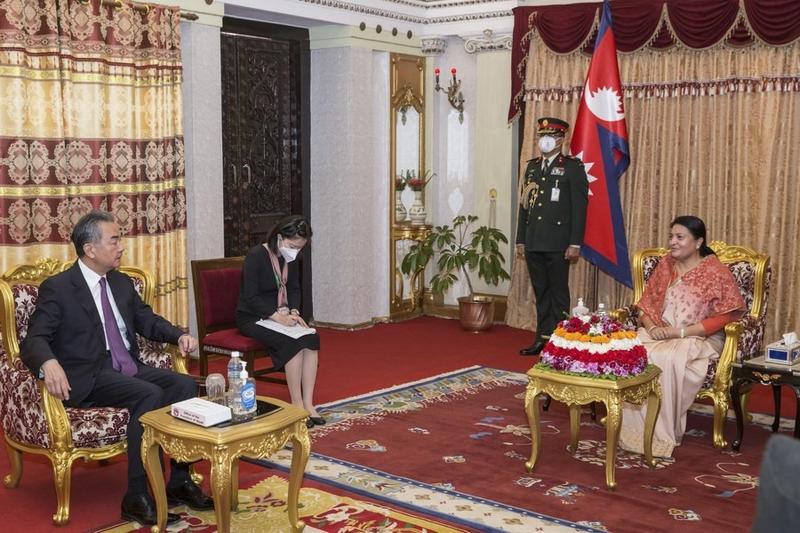 Nepali President Bidya Devi Bhandari (right) meets with visiting Chinese State Councilor and Foreign Minister Wang Yi in Kathmandu, Nepal, March 27, 2022. (HARI MAHARJAN / XINHUA)
Nepali President Bidya Devi Bhandari (right) meets with visiting Chinese State Councilor and Foreign Minister Wang Yi in Kathmandu, Nepal, March 27, 2022. (HARI MAHARJAN / XINHUA)
Maintaining cordial relationships with China and India and moving forward practical cooperation with both the giant Asian neighbors are among priorities of Nepal, officials and experts said.
In the wake of Chinese Foreign Minister Wang Yi’s trip to Kathmandu last week and ahead of an official visit to India by the Nepalese prime minister, Nepal sees an opportunity to connect better with the two most powerful economies in Asia and promote viable economic integration, according to senior Nepali diplomats in India and a former prime minister of Nepal.
In the wake of Chinese Foreign Minister Wang Yi’s trip to Kathmandu last week and ahead of an official visit to India by the Nepalese prime minister, Nepal sees an opportunity to connect better with the two most powerful economies in Asia and promote viable economic integration, according to senior Nepali diplomats in India and a former prime minister of Nepal
Maintaining cordial relationship with India and China are the priorities of Nepal, and there are no other options than to work together for the common good and prosperity, said Ram Prasad Subedi, charge d’affaires at Nepal’s embassy in New Delhi.
Madhav Kumar Nepal, who served as Nepal’s prime minister between 2009 and 2011, said friendly relations with the two Asian giants will help Nepal bring cooperation in diverse areas such as connectivity, education, health, infrastructure, hydropower and river training, and facilitate more trade, economic and cultural exchanges.
Nepal’s current prime minister, Sher Bahadar Dueba, will pay an official visit to India from April 1 to 3 at the invitation of his Indian counterpart Narendra Modi. It will mark Deuba’s first visit to New Delhi since he assumed office in July 2021.
ALSO READ: China, Nepal reaffirm traditional friendship
The visit will further strengthen the multifaceted, age-old, and cordial ties between Nepal and India, Nepal’s foreign ministry said in a statement.
Nepal will focus on its bilateral agenda, rather than regional or multilateral issues, during the visit, according to Subedi.
Deuba’s trip to New Delhi comes days after Wang met the prime minister and other top Nepalese officials in Kathmandu over the weekend. It was last stop of Wang’s diplomatic visit to China's four neighboring countries in Asia.
China and Nepal have been good friends for thousands of years, having always supported each other and setting an example of win-win cooperation between large and small countries, Wang said.
“We are glad to see that friendship with China has become a social consensus that transcends all parties in Nepal.”
ALSO READ: Xi says China to continue support for Nepal's virus fight
During the trip, Wang and his Nepalese counterpart signed agreements on a feasibility study for setting up train lines between the two countries. Another agreement involved a feasibility study for a power grid connecting China and Nepal. In all, Nepal and China signed nine agreements and documents during the visit.
They underscored the importance of the exchange of high-level visits on a regular basis to strengthen mutual trust and confidence and to further consolidate Nepal-China relations, according to a statement by Nepali foreign ministry.
Before landing in Nepal, Wang visited Afghanistan, India and Pakistan. The tour came as somewhat unexpected for some Western countries which have been focused on the Ukraine issue.
Summing up the outcome of talks in New Delhi to Chinese official media, Wang said on March 29 that he has most keenly felt that both sides agreed to adhere to the important consensus reached by the two heads of state that “the two countries are not threats to each other but opportunities for each other's development”, and that they should properly solve practical problems of common concern, handle and manage differences, and promote the steady and sustainable development of bilateral ties.
ALSO READ: China to push for continued advancement of ties with Nepal
Indian experts said Wang’s trip to Kathmandu and the forthcoming visit of the Nepalese prime minister to India has wider significance, beyond economic cooperation.
Nepal is intensely working to shore up ties with India and China, said Alka Acharya, a professor at the Centre for East Asian Studies at Jawaharlal Nehru University's School of International Studies, New Delhi. Nepal is also working as a “vibrant bridge” between the two Asian giants, she said.
There are more areas of cooperation between India and China, due to shared geography and common issues such as tackling poverty, climate change and unemployment, said Madhav Nepal, the former Nepali prime minister.
India accounts for 64 percent of Nepal’s total volume of trade, according to data from India’s Economic Survey of 2018-19.
The Himalayan kingdom is sandwiched between the world's two most populous countries, and success of any Nepali government is measured on the basis of its ability to keep cordial relations with both India and China, experts noted.
READ MORE: China bolsters strong ties with Pakistan, Nepal
As Nepal enters an era of economic development, it needs more foreign investment, they said.
Geographically and strategically it is also important for Nepal to keep friendly relations with the two neighbors. During the Cold War, the nation decided to remain non-aligned in order to get cooperation from both the blocs, said Sanjay Rao Ayde, professor and head of the political science department at St. Stephen's College, New Delhi.
Nepal is now in a similar situation where it cannot shut its door to a particular country, and the trajectory of its foreign policy appears to be largely non-aligned. Nepal wants to continue friendly relations with both its powerful neighbors as it seeks to reap benefits, Ayde said.
The writer is a freelance journalist for China Daily.


